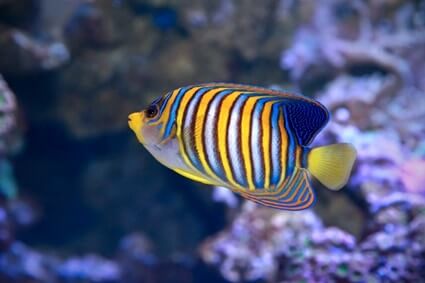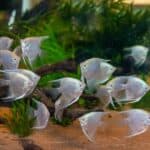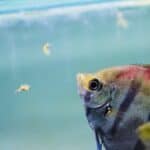Freshwater angelfish are known for their slender appearance. Even a perfectly healthy, well-fed angelfish will remain thin and lean. For this reason, if a fish gains weight, you’ll notice it immediately.
Fat angelfish have a slight bulge in their stomach, making them look wider at the bottom. If an angelfish seems rounder than usual, you’ll likely wonder what’s wrong with it.
Angelfish can get fat from egg carrying, illness, tumors, overeating, and poor water conditions. Angelfish are also prone to intestinal parasites that cause their guts to expand.
Some issues impact the health of fish more severely than others. In the best case, the fish may be about to lay eggs; at worst, it could have an untreatable condition that’ll be lethal.
So, observe the fish’s behavior, swimming patterns, and daily routine to determine the difference.
Do Angelfish Get Fat?
When angelfish get fat, the only visible change is in their stomach, right where the fins are located, because that area becomes swollen and round, almost as if it has swallowed a marble.
There are many reasons why this could happen. Some are cause for concern, while others are positive. Either way, you can determine why an angelfish got fat by:
- Keeping a close eye on how it behaves.
- Monitoring how you care for it.
It’ll be hard to know the reason just by looking at the swelling alone.
Here are the most common reasons why angelfish gain weight:
Gravid Fish
The cause of an angelfish’s round belly could be because it’s gravid. It’s noteworthy that angelfish don’t carry live young in their stomachs.
A female will carry unfertilized eggs, which she releases in a predetermined corner of the tank. The male then fertilizes the eggs in a process that lasts about 2 hours.
Female angelfish produce eggs whether they’re near a male angelfish or not. If you have a lone angelfish in a tank that looks bloated, it could be a female carrying eggs that’ll never be fertilized.
How to Tell If An Angelfish Is Pregnant
The first sign that an angelfish is pregnant appears before the belly expands. You can identify angelfish that are carrying eggs based on the following behaviors and physical changes:
Inactivity
Pregnant angelfish don’t spend much time swimming around. They swim slowly and take it easy most of the day, usually staying in one part of the tank.
Pairing Up
Angelfish are monogamous. The males are very involved with their offspring from:
- The moment the female produces eggs.
- Up until the fry (baby angelfish) can swim independently.
Paired angelfish will often protect and keep each other company. If the fat angelfish in the tank is seen spending time with another fish, they’re most likely mated.
Nest Cleaning
Paired angelfish spend 1-2 days cleaning the area where the female will lay the eggs.
Protruding Papilla
Pregnant angelfish have a small tube, usually red or black, that protrudes from their stomach.
It might be hard to see, especially since female angelfish have a flatter papilla than male angelfish. You’ll know that you can expect baby angelfish soon if you see it.
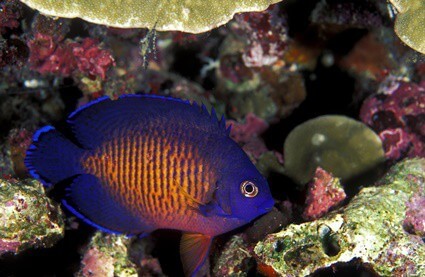
Tumors
According to a study from the University of Florida, fish tumors are mainly caused by retroviruses. These viruses copy themselves as a part of a cell’s DNA, which it does by:
- Taking a cell’s DNA.
- Reverse transcribing it back into RNA.
- When the RNA is converted back to DNA, the virus has implanted itself in the code.
Because the retrovirus’s sequence changes so often, it’s difficult to treat a tumor caused by it.
How to Tell If An Angelfish Has a Tumor
At a glance, it may be hard to identify a tumor in a fish. However, you can look for these signs:
Change in Appetite
Tumors in the gut of an angelfish interfere with the fish’s digestion. A fish with a tumor will slowly lose its appetite, which causes its deterioration and eventual death.
Attacked by Other Fish
Fish are highly opportunistic, a trait that sometimes leads them to cannibalism.
Even when properly fed, they may still take the chance to feast on other fish. When a fish in the tank is weak and unable to defend itself, the other fish might try to eat it.
Bumps in Other Locations
Try to spot other tumors growing on the fish’s body. In particular, these should appear on the:
- Mouth
- Gills
- Fins
Severe Protruding of Scales
When an angelfish is overfed or carrying eggs, their stomach expands visibly. Most of the time, their stomach doesn’t extend to the point that the scales are affected, but that’s not the case with tumors.
Are the scales on and around the enlarged belly altered and lifted? A severe infection or tumor usually causes this to occur.
Overfeeding
As mentioned, fish are opportunistic, and survival is always on their mind. Even after eating, they’ll crowd around flakes you drop into the water, which makes it easy to overfeed a fish.
However, the body may not swell from the food itself. Instead, swelling will result from constipation, which overeating causes. Angelfish are more likely to suffer from overfeeding due to their lean bodies.
How to Tell If Your Angelfish is Overfed
You can check for these signs:
Constipation
This might be the most challenging behavior to observe if there’s more than one fish in the tank.
However, if the angelfish is overfed, one of the consequences is being unable to poop.
Fish Food At The Bottom of The Tank
Any excess food the fish can’t eat within 2 minutes will sink to the bottom of the tank and begin to decompose. No matter how hungry they are, fish will ignore that rotten food.
Gasping For Air
When fish food begins rotting at the bottom of the tank, it affects the chemistry in the water, causing oxygen levels to diminish. When this happens, fish swim to the water’s surface and gasp for air.
Dirty Water
If the water gets dirty no matter how often you change it, all the uneaten food may be the cause.
Disease
According to the Department of Fisheries and Aquaculture in Gainesville, Florida, angelfish are prone to many intestinal parasites. Among the most common are:
- Hexamita
- Capillaria
- Myxosporidians
- Eurystrongylus
- Coccidia
Aside from bacteria, these diseases are also caused by the angelfish experiencing changes in:
- Water
- Diets
- Temperature
How to Know If An Angelfish Has A Disease
While that seems like a wide range of possible diseases, don’t worry. There are ways for you to identify these problems:
Unusual Swimming Patterns
Sick fish aren’t in complete control of their bodies. When infected, they begin:
- Swimming sideways.
- Twisting around.
- Curling into themselves.
An angelfish with an unusual swimming pattern needs treatment.
Loss of Appetite
Parasites make us feel like anything we eat will harm us. The same thing happens with fish.
What if you no longer see a fat angelfish race to the surface to get some food when it’s lunchtime? In this situation, you should be concerned.
Skin Discoloration
Angelfish change the color of their scales when:
- Stressed.
- Sense light changes in the environment.
However, a bloated belly coupled with skin discoloration could lead to trouble. Parasites usually cause the skin on the angelfish to either darken or become lighter.
Severely Protruding Scales
Besides skin discoloration, parasites also change the way angelfish scales function.
Fish have scales for protection against germs and water friction. However, if a fish is already affected by a parasite, the scales will lift and protrude from the fish, weakening its defense system.
What To Do If My Angelfish Has A Big Stomach
After identifying what could be wrong with the angelfish, the next logical step is treatment.
Even when pregnant, there’s always something you can do to ensure the fish is comfortable. Let’s explore ways you can help the fish transition healthily from bloated to slim again:
Pregnancy
Is your fish expecting? If so, you can do the following:
Don’t Change The Water Too Often
Angelfish get very stressed from changes in the water. This may include:
- Temperature
- pH
- Ammonia levels
- Oxygen
Unless you have to, don’t change the water too often.
Separate The Other Fish
Angelfish grow aggressive when pregnant. Consider separating the angelfish pair from the other fish.
Angelfish don’t like being moved around too much, especially if they’ve chosen a spot where the mother will lay her eggs. If possible, move the other fish into a separate tank and leave the pair alone.
Don’t Add New Fish
As mentioned, pregnant fish get aggressive, so adding new tank mates will only raise a pregnant angelfish’s stress levels.
Sufficient Food
Pregnant angelfish will be lethargic, which means the female won’t be as fast as the others when it’s time to eat. She might not get enough food due to her lack of speed.
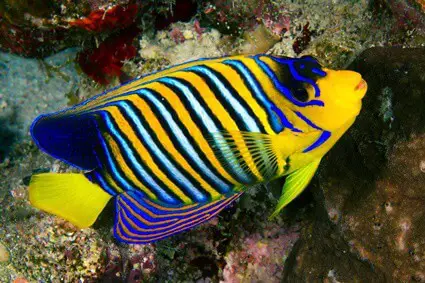
Tumor
Tumors in fish are challenging to treat because there aren’t many practical solutions. Most gut surgeries aren’t successful, usually due to the tumor’s placement.
The most successful tumor remedies for fish appear on the fins, which can be treated with special medicated water. The gut is a different story.
Still, even if you self-diagnose the fish as having a gut tumor, let a vet confirm it. This will be done with an ultrasound, and the vet can explain how to proceed.
Overfeeding
Is your angelfish getting fat because of food? Then you should:
Have A Schedule
A schedule will allow for more organization when it comes to the healthy habits of your fish. This includes feeding the fish, dimming the lights, changing the water, etc.
Feed The Proper Amount
Young angelfish eat 4-5 times, and adult angelfish eat 2-3 times daily.
Some people make the mistake of feeding based on the tank size, but you should measure how much food to give based on the number of fish in the tank.
Change The Other Fish
Not all fish require identical amounts of food each day. If the angelfish are in a community tank with different species, consider separating the voracious eaters from the angelfish.
Treat The Constipation
Treat constipation by using a bit of castor oil and Epsom salt. You can also change the regular fish food to one with more fiber.
Disease
If you’re dealing with an angelfish disease, you can:
Quality of Water
Change out the water if it looks dirty or hasn’t been cleaned in a long time. The water should be changed every 2-4 weeks, depending on how many fish are in the tank.
Eliminate Stress
Stress can cause your angelfish to become ill. If the angelfish is in a community tank, ensure the tank mates are most compatible with them.
Likewise, the tank should be where there aren’t too many people passing by. Lights shouldn’t be switched on or off because the constant movement and light changes will stress them out.

